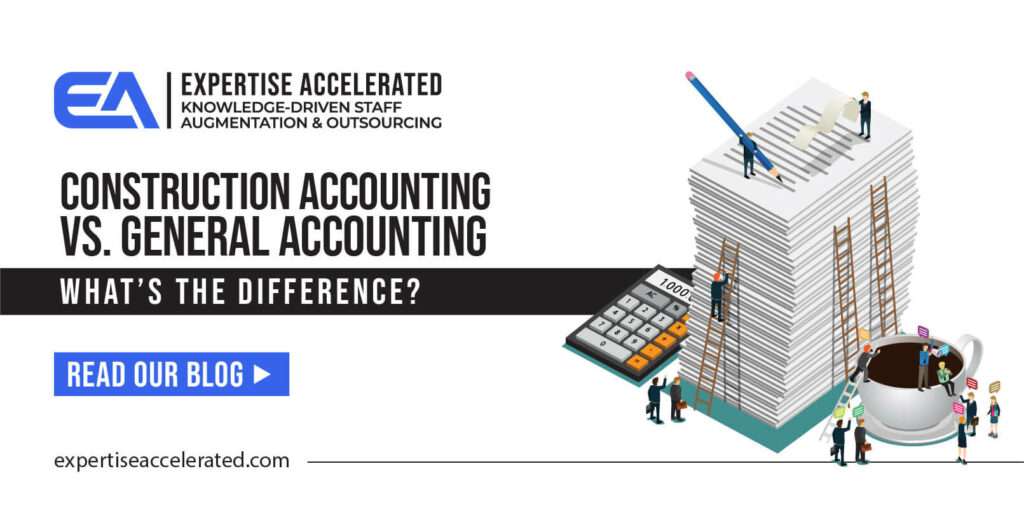Recognizing the Importance of Building And Construction Bookkeeping for Effective Job Administration

Function of Construction Accountancy
Construction bookkeeping offers as the foundation of financial administration in the building and construction market, guaranteeing that tasks are finished within budget plan and monetary purposes are met. construction accounting. This specialized bookkeeping strategy addresses the unique difficulties dealt with in building tasks, consisting of differing task periods, varying expenses, and several stakeholders
One of the primary functions of building accountancy is to give precise price estimate and monitoring throughout the job lifecycle. This assists in educated decision-making, enabling task supervisors to adjust resources and timelines effectively. In addition, building and construction audit boosts cash money flow management by keeping an eye on accounts receivable and payable, therefore making certain that funds are readily available for prompt repayments to suppliers and subcontractors.
It outfits project supervisors with the required monetary data to prepare detailed financial statements, which are necessary for audits and monetary evaluations. Inevitably, the role of construction audit extends past mere financial tracking; it is essential to tactical planning and functional performance, driving the success of construction tasks in a competitive landscape.
Secret Components of Building And Construction Accountancy

Budgeting develops a financial structure that guides task implementation, enabling managers to assign resources effectively and anticipate potential monetary challenges. Precise expense tracking is vital for surveillance expenses in real-time, helping to determine variances between forecasted and actual expenses. This makes it possible for prompt modifications to maintain the task on spending plan.
Additionally, economic reporting provides stakeholders with a clear picture of the project's economic health and wellness. Regular records, such as profit and loss statements and capital evaluations, facilitate educated decision-making and enhance openness amongst all parties involved.
Additionally, conformity with sector policies and bookkeeping requirements is crucial. This guarantees that economic practices are not only reliable however also legal, securing the company against lawful repercussions. By incorporating these vital elements, building and construction audit promotes a structured technique to handling funds, inevitably adding to the successful completion of construction tasks.
Advantages for Task Managers
Leveraging effective building and construction accountancy methods provides task managers with a plethora of benefits that boost both functional efficiency and financial oversight. One considerable benefit is improved budget plan administration. Accurate monitoring of expenses and incomes enables task supervisors to keep an eye on financial efficiency in actual time, ensuring jobs remain within spending plan and assisting in timely modifications when required.
In addition, building accounting streamlines capital administration, making it possible for project managers to prepare for monetary demands and optimize resource appropriation. By comprehending money inflows and discharges, they can better manage payments to subcontractors, suppliers, and employees, therefore staying clear of expensive hold-ups.
Furthermore, durable accounting systems supply comprehensive reporting capabilities. Project managers can create records that provide insights right into project success, cost variations, and source usage. This data-driven approach fosters notified decision-making, permitting supervisors to determine potential concerns proactively and carry out rehabilitative measures.
Finally, adherence to building bookkeeping requirements makes certain compliance with regulatory and lawful needs, minimizing the risk of conflicts or fines. Generally, effective building bookkeeping furnishes task supervisors with the tools necessary to drive task success, enhance stakeholder confidence, and advertise lasting organizational growth.
Usual Challenges in Construction Audit
Numerous project supervisors run into substantial difficulties in building and construction audit that can impede job success. One of the primary obstacles is pop over to this site the intricacy of tracking numerous job websites, each with distinctive budget plans, timelines, and source allocations. This needs precise interest to information, which can be overwhelming without a robust audit system in area.
Additionally, changing material prices and labor rates can complicate budget plan management, making exact projecting difficult. Project supervisors typically have a hard time to reconcile these costs with real expenditures, causing possible monetary discrepancies.
Additionally, building and construction audit involves conformity with different regulations, including tax commitments and labor regulations. Browsing these rules can be overwhelming, especially for supervisors who may not have a strong accounting background.
An additional substantial difficulty is managing capital, which is important in the building and construction industry. Hold-ups in invoicing, repayments from customers, or unanticipated job changes can produce cash circulation lacks, endangering the job's progress.
Last but not least, reliable interaction between job managers, accounting professionals, and area groups is important. Misconceptions can cause inaccurate economic reporting, even more making complex task administration efforts. Addressing these difficulties proactively is crucial for successful building and construction audit.

Finest Practices for Effective Bookkeeping
While browsing the intricacies of building audit can be complicated, embracing ideal methods can considerably improve monetary monitoring and job success. One basic technique is preserving prompt and precise records. Executing durable bookkeeping software tailored to building and construction jobs can improve information access, invoicing, and reporting, lowering mistakes and conserving time.
Furthermore, developing a clear spending plan and routine tracking website link versus this budget plan are important. Employing a system of periodic monetary reviews enables project managers to identify variances early, facilitating timely decision-making. It is likewise vital to separate project expenses right into direct and indirect classifications, allowing clearer insights right into success.
Another best technique includes fostering open communication amongst all stakeholders. Regular updates and collaborative discussions regarding economic status can make sure everyone is straightened and educated. Training staff in construction-specific accountancy principles better boosts competency and accuracy.
Last but not least, ensuring compliance with appropriate accounting standards and guidelines is non-negotiable. Regular audits and interior reviews add to transparency and responsibility, constructing trust with stakeholders and customers. By concentrating on these finest methods, construction companies can optimize their bookkeeping procedures, inevitably driving job success and financial security.
Final Thought
To conclude, construction audit plays an essential role in making sure successful job administration by promoting accurate monetary oversight and enhancing decision-making. By incorporating vital parts such as expense estimate, capital management, and conformity, job managers can navigate usual difficulties and utilize finest methods for reliable bookkeeping. Inevitably, a durable building bookkeeping structure not only safeguards spending plan integrity but additionally adds to the total economic health of construction tasks, promoting lasting success within the sector.
By integrating these crucial components, construction accounting cultivates an organized strategy to handling economic sources, ultimately contributing to the successful conclusion of construction tasks.
Exact monitoring of expenses and incomes allows task supervisors to keep an eye on financial performance in real time, ensuring jobs stay within budget plan and assisting in timely changes when necessary.
Project supervisors can create records that provide understandings into task success, expense variances, and source utilization.Numerous task supervisors run into significant challenges in building and construction audit that can hinder job success. construction accounting. Eventually, a durable construction bookkeeping structure not just safeguards budget plan honesty but additionally contributes to the total financial health and wellness of construction projects, cultivating lasting success click to investigate within the industry